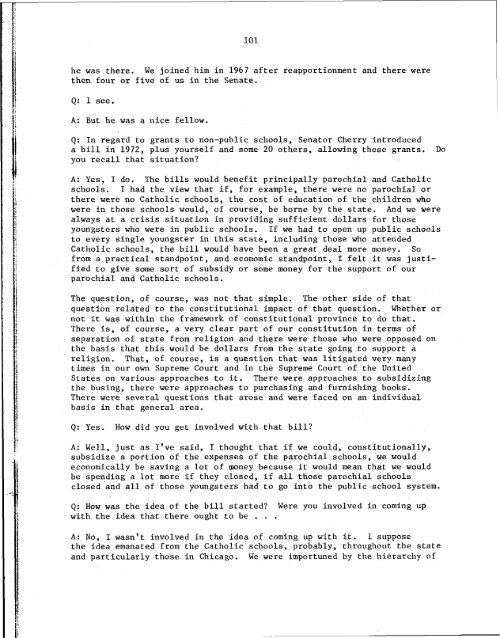Cecil A. Partee Memoir - University of Illinois Springfield
Cecil A. Partee Memoir - University of Illinois Springfield
Cecil A. Partee Memoir - University of Illinois Springfield
Create successful ePaper yourself
Turn your PDF publications into a flip-book with our unique Google optimized e-Paper software.
he was there. We joined him in 1967 after reapportionment and there were<br />
then Sour or five <strong>of</strong> us in the Senate.<br />
Q: I see.<br />
A: But he was a nice fellow.<br />
Q: In regard to grants to non-public schools, Senator Cherry introduced<br />
a bill in 1972, plus yourself and some 20 others, allowing these grants.<br />
you recall that situation?<br />
Do<br />
A: Yes, I do. The bills would benefit principally parochial and Catholic<br />
schools, I had the view that if, for example, there were no parochial or<br />
there were no Catholic schools, the cost <strong>of</strong> education <strong>of</strong> the children who<br />
were in those schools would, <strong>of</strong> course, be borne by the state. And we were<br />
always at a crisis situation in providing sufficient dollars for those<br />
youngsters who were in public schools. If we had to open up public schools<br />
to every single youngster in this state, including those who attended<br />
Cathalic schools, the bill would have been a great deal more money. So<br />
from a practical standpoint, and ecanamic standpoint, I felt it was justified<br />
to give some sort <strong>of</strong> subsidy or some money for the support <strong>of</strong> our<br />
parochial and Catholic schools.<br />
The question, <strong>of</strong> course, was not that simple. The other side <strong>of</strong> that<br />
question related to the constitutional impact <strong>of</strong> that question. Whether or<br />
not it was within the framework <strong>of</strong> constitutional province to do that.<br />
There is, <strong>of</strong> course, a very clear part <strong>of</strong> our constitution in terms <strong>of</strong><br />
separation <strong>of</strong> state from religion and there were thase who were opposed on<br />
the basis that this would be dollars from the state going to support a<br />
religion. That, <strong>of</strong> course, is a question that was litigated very, many<br />
times in our own Supreme Court and in the Supreme Court <strong>of</strong> the United<br />
States on various approaches to it. There were approaches to subsidizing<br />
the busing, there were approaches to purchasing and furnishing books.<br />
There were several questions that arose and were faced on an individual<br />
basis in that general area.<br />
Q: Yes. How did you get involved with that bill?<br />
A: Well, just as I've said, I thought that if we could, constitutionally,<br />
subsidize a portion <strong>of</strong> the expenses <strong>of</strong> the parochial schools, we would<br />
economically be saving a lot <strong>of</strong> money because it would mean that we would<br />
be spending a lot more if they closed, if all those parochial schools<br />
closed aqd all <strong>of</strong> those youngsters had to go into the public school system.<br />
Q: How was the idea <strong>of</strong> the bill started? Were you involved in coming up<br />
with the idea that there ought to be . . .<br />
A: No, I wasn't involved in the idea <strong>of</strong> coming up with it. I suppose<br />
the idea emanated from the Catholic schools, probably, throughout the state<br />
and particularly those in Chicago. We were importuned by the hierarchy <strong>of</strong>
















